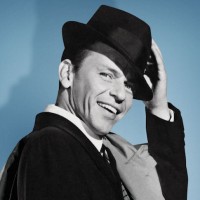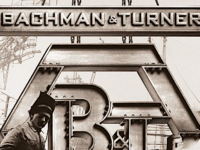NICK DERISO: One of those all-star dates that bridges genres, even generations, “The Trumpet Kings” is an amalgamation of so many concurrent joys that it’s a wonder this Pablo release ever got made.
We have out front one Big Joe Turner, a 6-2, 300-something pound Kansas City belter known as the Boss of the Blues — and one capable of stirring winking belly laughs one moment and crashing heartbreak the next. Over a career that dated back to the 1920s, Turner could legitimately lay claim to helping found both R&B as well as rock ‘n’ roll. On this record, Joe solidified forever his place in jazz, without giving up any of his juke-joint street cred.
Two of the included tunes are more than 13 minutes in length, time enough for billowing solo turns from a Hall of Fame group of trumpeting guests — including bebop pioneer Dizzy Gillespie; the competitive and chance-taking Roy Eldridge (a key influence on Diz); fun-loving Basie and Ellington alum Clark Terry; and master technician Harry “Sweets” Edison, another longtime Basie band member.
A connection with the Count provided the spark that launched Turner’s career, too. Joe was filling in for a then-ailing Basie vocalist Jimmy Rushing during a 1951 date at Harlem’s Apollo Theater when he was discovered, and often returned the favor by guesting with the group in later years. A singer with saxophone-like texture and brawn, Turner would become the perfect accompaniment on “The Trumpet Kings.”
Eldridge and the brilliant Gillespie trade tasty licks during the rollicking choruses of “I Know You Love Me Baby,” while Roy and Terry share a few friendly barbs on “Mornin’, Noon and Night.” Then Terry, a bubbling joy and (as the original liner notes so melodiously state) a “great Ellingtonian,” shimmers after a gorgeously subdued solo by Sweets on “T’Aint Nobody’s Business.”
Turner answers, line for line, with honest, emotional authority.
Oddly enough, all five of the main performers were born over a span of just one decade ending in 1920, yet they resided musically in often ornately different places.
Terry was the imp, while Gillespie was more often smart and sharp. Eldridge (who late in his career played alongside Ella Fitzgerald) remained an understated soloist of the highest order, while Edison was classically inventive. The group is rounded out (quite literally, really) by Turner — a Rock ‘n’ Roll Hall of Famer for “Shake, Rattle and Roll” who was a shouter’s shouter, this braying beauty of a blues singer.
Together, they sounded new all over again; it was like finding an undiscovered country. Often, the jazzers pushed Turner to fresh rhythmic heights of traditional 12-bar iambic pentameter. But just as typically, his incisive vocal work also inspired gritty, more soulful thoughts from the household-named horn players.
A terrific rhythm section, part of Turner’s working group at the time, includes Pee Wee Crayton on guitar.
- Nick DeRiso’s Best of 2015 (Rock + Pop): Death Cab for Cutie, Joe Jackson, Toto + Others - January 18, 2016
- Nick DeRiso’s Best of 2015 (Blues, Jazz + R&B): Boz Scaggs, Gavin Harrison, Alabama Shakes - January 10, 2016
- Nick DeRiso’s Best of 2015 (Reissues + Live): John Oates, Led Zeppelin, Yes, Faces + others - January 7, 2016




